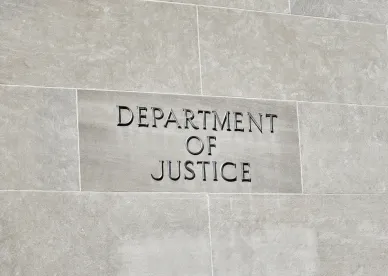Recent decisions by the Fraud Section of the Department of Justice (“DOJ”) suggest that the DOJ may be softening its stance against companies that voluntarily self-disclose violations of the Foreign Corrupt Practices Act (“FCPA”) by high-level corporate executives. Specifically, the DOJ’s decision to decline cases involving Insurance Corporation of Barbados Limited (“ICBL”) and Cognizant Technology Solutions Corporation (“Cognizant”) appear to signal that the DOJ is exercising more discretion not to charge companies for the crimes of senior management than might otherwise be expected under the terms of the DOJ’s FCPA Corporate Enforcement Policy.
The Cases
On August 24, 2018, the DOJ issued a declination letter to ICBL. In that letter, the DOJ found that ICBL paid approximately $36,000 in bribes to Barbadian officials in exchange for insurance contracts that generated approximately $93,940 in illicit profits. Significantly, however, despite finding that unspecified “high-level employees of ICBL” participated in the scheme, the DOJ declined to prosecute ICBL and ICBL agreed to disgorge the illicit profits. In reaching this outcome, the DOJ cited ICBL’s timely, voluntary self-disclosure, thorough and comprehensive investigation, cooperation, agreement to disgorge its profits, remediation (including termination of executives and employees involved in the misconduct), and “the fact that the Department has been able to identify and charge the culpable individuals.” Subsequently, on January 28, 2019, the DOJ announced that it had indicted the company’s former CEO and Senior Vice President for the bribery at issue in ICBL’s corporate resolution.
In September 2016, Cognizant announced in a securities filing that it was investigating potential FCPA violations in India and had voluntarily notified the DOJ and Securities and Exchange Commission (“SEC”). On February 13, 2019, the DOJ issued a declination letter to Cognizant, in which the DOJ found that Cognizant paid approximately $2 million in bribes to Indian officials to facilitate the development of an office park. As with ICBL, the declination letter went on to find that “certain members of senior management participated in and directed the criminal conduct at issue.” Again, however, the DOJ declined to prosecute, citing a number of factors, including the company’s swift self-disclosure within 2 weeks of the board learning of the misconduct, the thorough nature of the company’s investigation, full cooperation, remediation (including termination of those involved in the misconduct), the adequacy of civil or regulatory enforcement actions, including a settlement with the SEC, undertaking to disgorge ill-gotten gains, and the DOJ’s ability to identify culpable individuals. Two days later, the DOJ announced the indictment of Cognizant’s former president and chief legal officer, and the SEC announced a civil settlement in which the company agreed to pay $25 million, including $16.3 million in disgorgement, $2.7 million in prejudgment interest, and $6 million in civil money penalties.
Lessons from the ICBL and Cognizant Declinations
Under the DOJ’s FCPA Corporate Enforcement Policy, companies seeking a declination are required to voluntarily self-disclose misconduct, fully cooperate with the government, and engage in timely and appropriate remediation. Even if companies satisfy these requirements, however, the policy provides “[a]ggravating circumstances that may warrant a criminal resolution,” and those aggravating circumstances “include, but are not limited to, involvement by executive management of the company in the misconduct.” The fact that the DOJ granted declinations to both ICBL and Cognizant – despite the fact that the DOJ found high-level executives at both companies were involved, and indeed obtained indictments against those executives – strongly suggests at least some evolution in the DOJ’s application of the policy.
As an initial matter, it appears that – even though it is technically an aggravating factor under the terms of the policy – the involvement of senior company executives in potential misconduct does not, in practice, necessarily prevent a company from obtaining the benefits of self-disclosure, cooperation and remediation under the policy. While the ICBL and Cognizant cases are significantly different in numerous ways, the fact that the DOJ elected to overlook the involvement of senior management suggests that the DOJ’s decision to grant declinations even in the face of these aggravating circumstances was not an aberration.
As a corollary, both cases strongly suggest that, notwithstanding recent changes to the DOJ’s individual accountability policies, the government remains committed to prosecuting individuals in large corporate cases, and are willing to exercise their discretion to reward companies that support those efforts.
Finally, the DOJ’s conclusion that the adequacy of civil and administrative remedies in the Cognizant case weighed in favor of a declination is also worthy of note. The DOJ’s willingness to invoke Cognizant’s settlement with the SEC when justifying its decision not to prosecute the company also appears to reflect the influence of the DOJ’s recently announced policy against “piling on,” or, more specifically, avoiding duplicative penalties against companies that may arise when the company faces probes by multiple government entities. This should be a welcome development for publicly traded and multinational companies, which are particularly likely to be subject to parallel probes by multiple domestic and foreign authorities.





 />i
/>i

